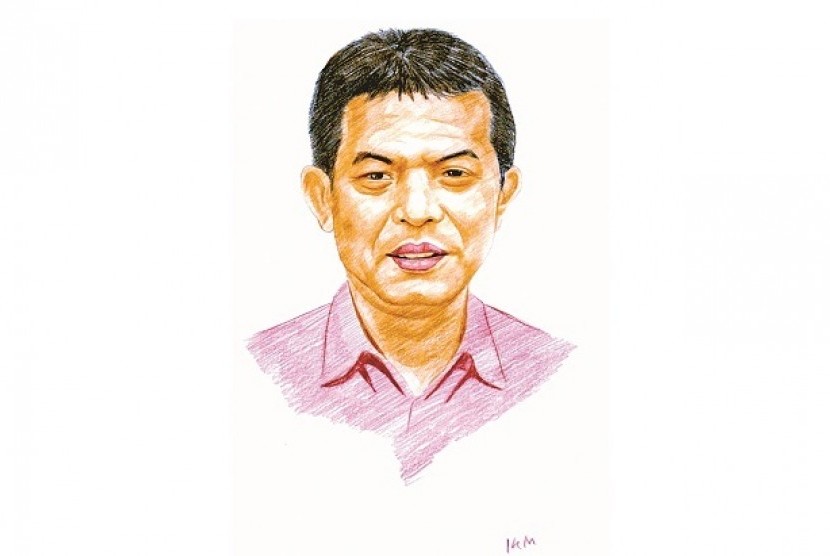REPUBLIKA.CO.ID, By: Ikhwanul Kiram Mashuri
On hearing news of the death of Mandela, it's not just people in South Africa were feeling sad, the world also mourn him. They, the citizens of the world, ranging from the west to the east of the south to the north, expressed their sadness. They feel the loss of a role model.
Some world leaders ordered to hoist the flag at half-mast as a day of mourning. Several world leaders said they would fly directly to Johannesburg to attend Mandela's funeral, including US President Barack Obama, and the two presidential predecessors, George W. Bush and Bill Clinton. Russian President Putin was also rumored to attend the funeral of leader who always wore Indonesian batik.
The greatness of the sense of loss to the death of Mandela (Nelson Rolihlahla Mandela) was made me curious. I was reminded of a lesson at my childhood in pesantren (Islamic boarding school). "Wannasu alfun minhum kawahidin. Wawahidun kal alfi in amru 'ana," my teacher said. Its means roughly like this: Thousand men on them like one. And a person is like a thousand if he paid attention (to the thousand).
Another teacher said that a great man would look great precisely when he had died. Other Ustad said, explaining a hadith of the Prophet Muhammad [PBUH], said, the best human beings is a long age and accompanied by lots of pious charity. Worst people are the longevity and bad behavior. "That's why the prayer for long life is permissible only if it is followed by the prayer of many with pious charity," he said.
Mandela obviously never attended pesantren. However, given the long history of his life, it look in his daily life he practice the values and teachings of the cleric and kiai to the students. See the history of his life. Mandela was not the vengeful type. As he sworn in as President of South Africa (1994-1999), Mandela invited the white men who had imprisoned him for 27 years as a guest of honor. He received them with a warm and friendly. He forgave them before they apologized.
Many people who call themselves as fighters. Many become brave against a despotic regime power. Many also suffer from psychological and physical torture during imprisonment. However, very rarely of those who went on to become a national leader statesmen like Mandela. The latter has suffered torment from mild to severe. It could be when he was in power to revenge the torturer, throw them into jail, anyone who had been his political opponent. However, with Mandela's magnanimity to forgive anyone who has ever made him to suffer many years in prison.
As a law graduate Mandela could build his nice future as a lawyer. It can also cooperate with the regime. But, Mandela preferred to fight for the people who suffer due to impacts of the political apartheid. He also was not afraid to face the trials that threaten the death penalty. Several times he was offered exemption on condition of cooperate with authorities.
However, he also repeatedly refused parole. He just wants unconditional release, his freedom after languishing in prison for 27 years. For Mandela, his country and nation interest is number one. No more and no less. No matter when he had left his beautiful wife. No matter also, when friends had to leave one by one, because of his political views and ideological differences. It does not matter when he was criticized by party colleague when he refused to be elected as president for a second term.
The rejection was intended for political education for generations to come, that a state must prioritize the system. The system is based on legislation and law. For Mandela, a country must not only controlled by one person. Rulers should not greedy for power and to rule all his life however huge his services are.
What Mendela did is, including his one term presidential period, is to give an example not only for South Africa, but also for other countries, especially in Africa.
Every observer predicted that the number of states in Africa will experience political turmoil after independence from occupation. They predicted there will be a bloody power struggle.
Mandela wanted to prove that their estimates, especially by the West, were wrong. Mandela proved them that Africans could run their own state and nation correctly. It turned out that after Mandela no longer president, South Africa became a democratic country.
The power transition was done normally. In fact, many countries in Africa then followed the trail of a democratic South Africa.
For Mandela, to be submissive to the nation, state, and humanity in general does not have to be a ruler. To lead is eternal. Mandela has proved everything. He became a leader against apartheid when he was young, he still leads behind bars. As president, he focused on removing the influence of apartheid to fight racism, poverty, and promote social and racial reconciliation.
Mandela also remained as a leader when it no longer served as president, a leader who inspire and move the nation. He was active in charitable institutions to eradicate poverty and HIV and AIDS through the Nelson Mandela Foundation. With the humanitarian activity, the effect his activity was cross-border.
He received more than 250 awards, including the Nobel Prize for Peace in 1993, the President of the United States Freedom Medal, and the Order of Lenin of the Soviet Union.
To end this paper I would like to quote the words of Ibn Duraid Al Azdy (d. 321 H), "Wainnama al mar-u haditsun ba'dahu. Fakun haditsan hasanan liman wa'aa." It means, the man measured from his/her influence after he/she died. So make good influence in your lifetime.
Ed: Heri Ruslan


